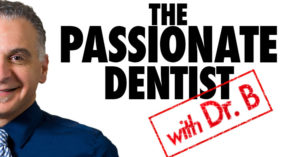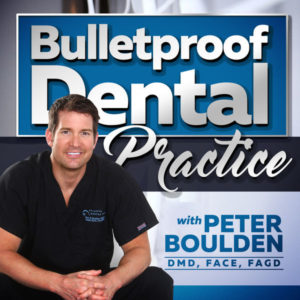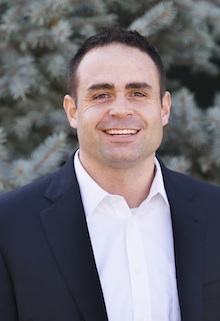by Karah Karah | Mar 29, 2017 | Bold Biographies, Maverick Mind Shifts, Prescriptions for your Practice
Podcast: Play in new window | Download
 Today’s episode is a little different. Instead of me interviewing our guest, Dr. Bilal Saib of The Passionate Dentist podcast, we interview each other about the highs and lows of our careers and the joys of podcasting.
Today’s episode is a little different. Instead of me interviewing our guest, Dr. Bilal Saib of The Passionate Dentist podcast, we interview each other about the highs and lows of our careers and the joys of podcasting.
Dr. B is a fellow dentist and podcaster based in North Carolina. He’s also a frequent missionary to the West Bank, where he performs free dental work in communities in need. In this episode, we talk about how our shows have given us a greater sense of community with other dentists, and dig into our careers.
Dr. B and I talk about the lack of confidence among dentists, which is exacerbated by our tendency to only talk about the good things happening in our practices. We discuss the self-reflection that goes into building your own practice and learning how to manage a team, and how it’s made us better people. Dr. B also shares some of his experiences with missionary work, a unique but meaningful challenge he feels compelled to undertake.
Key Quotes:
- When you decide to own dental practice, you have to step up to the plate and do what is required of you.
- The thing that makes us more fulfilled and makes our practices grow is the psychology of you, the owner, and there’s nothing more powerful in psychology than confidence.
- What the practice requires of me has made me such a better person.
- I go on mission trips because I’m sharing my gift. And my gift is all these little tidbits of things that are lined up perfectly to create this perfect environment.
- I chose to have a low volume, high-quality practice even before I started my practice.
- Dentists are sometimes so benevolent that we forget the time and energy that we put into our education, hiring and firing staff, and patient relationships – there’s a lot of equity there – either because we come from humble beginnings or because we come from a place of give, give give.
- One of the first questions I ask dental students is: “why did you choose to become a dentist?”
- The first check I ever wrote myself was $100. It was a symbolic gesture of my three year anniversary.
- You learn a lot from practice management because when you have a busy practice, you learn what you want and you learn what you really don’t want. And there’s huge value in knowing what you want.
- Don’t treat insurance patients differently than non-insurance patients. Don’t cut your quality short. Do your very best with every patient, even if they’re on insurance.
Featured on the Show:


by Karah Karah | Mar 22, 2017 | Prescriptions for your Practice
Podcast: Play in new window | Download
 Disability coverage isn’t something most dentists think about, especially when they feel young and bulletproof at the beginning of their careers. But my guest today, Chris Bransgrove, knows that dentists need to consider the possibility that they could develop a disability and jeopardize their practice and career.
Disability coverage isn’t something most dentists think about, especially when they feel young and bulletproof at the beginning of their careers. But my guest today, Chris Bransgrove, knows that dentists need to consider the possibility that they could develop a disability and jeopardize their practice and career.
Chris is an advisor at Lucet Advisors and specializes in helping dentists understand the kind of disability coverage they need. When insurance companies know how to stack the deck against your practice, it’s important to have someone on your side that knows the ins and outs of contracts and disability coverage.
Chris and I break down some myths about disability insurance that you may believe and provide you with accurate information instead. We cover a lot of ground, including the definition of disability you want your contract to have; coverage for partial and residual disabilities; what you need to know about coverage for mental health; and much more. Many dentists don’t review this stuff often enough, so be sure to tune in and find out what you should be doing differently!
Key Quotes:
- The insurance companies themselves are smart – they know how to stack the odds against the doctor and in the insurance companies’ favor.
- Disablity insurance itself is nothing more than a promise to pay.
- Generally, when it comes to definitions, the shorter it is, sometimes the better – because if it’s longer, it can leave more room for interpretation.
- What’s important in the language of the contract are the triggers, where this partial benefit kicks in and starts to make up lost revenue.
- When a doctor gets disability insurance for the first time, the insurance company looks at their income and good health – and what a future increase option does is it takes the second requirement of good health off the table.
- An elimination period or a waiting period is basically like a deductible, but instead of being in dollars, it’s in days.
- With vendors now, you can get an additional benefit just to cover student loans.
- Depending on the contract, some claims may be excluded or limited – the biggest one is mental nervous claims, and I prefer there not to be any limiting in my doctors’ contracts.
- There is a policy called overhead expense that allows you to keep the lights on or buys you time to find a suitable buyer.
Featured on the Show:
Registered Representative and Financial Advisor of Park Avenue Securities, LLC (PAS), 6455 S Yosemite St., 3rd Floor, Greenwood Village CO. Securities products/services and advisory services are offered through PAS, a registered broker/dealer and investment advisor, 303-770-9020. Financial Representative, The Guardian Life Insurance Company of America (Guardian), New York, NY. PAS is an indirect, wholly-owned subsidiary of Guardian. Wealth Strategies Group is not an affiliate or subsidiary of PAS or Guardian. Lucet Advisors is not a registered investment advisor.
PAS is a member FINRA, SIPC


by Karah Karah | Mar 1, 2017 | Bold Biographies, Magnificent Marketing, Prescriptions for your Practice
Podcast: Play in new window | Download
 This week, I’m thrilled to bring you an interview with fellow podcaster Dr. Peter Boulden: dentist, marketer, and businessman extraordinaire. Peter is the brains behind the Bulletproof Dental Practice podcast and the owner of several dental practices.
This week, I’m thrilled to bring you an interview with fellow podcaster Dr. Peter Boulden: dentist, marketer, and businessman extraordinaire. Peter is the brains behind the Bulletproof Dental Practice podcast and the owner of several dental practices.
Peter is here to talk about why he loves the business side of dentistry and what attracted him to the profession in the first place. He’s also one of the best advisors on dental marketing and systems out there, so be sure to tune in for that advice!
We chat about Peter’s first job out of dental school and why he offered to work three months for free – seriously! – just to be at a practice he admired. We then cover entrepreneurship and the ups and downs of owning your own practices. Peter shares some of the quotes and books that motivate him now and in hard times, and why he thinks perfectionism is a detrimental concept. He’s also chock-full of actionable marketing tips you won’t want to miss!
Key Quotes:
- I knew that my chances of being successful were more enhanced by coming back to the place where people knew and loved me.
- As a new grad, you have the tools but you are by no means ready to roll.
- People told me we were gonna fail, which is kind of a blessing because it fuels you every morning.
- I like the multiple ownership model because it keeps me busy, and I get to flex my muscles with marketing and systems and all that stuff.
- I’m a big fan of reverse engineering – visualizing what I want and then filling in the steps going backwards.
- I don’t strive for perfection; I strive for progress and value.
- People have depth in so many areas that I don’t and I just want to pull all the pearls I can from their brain.
- No one has a vested interest to grow your practice the way you’re going to.
- People will pay for value – and the same thing can transcend for dentistry.
- The only sure thing you have in this world is you. You are your best investment. So don’t doubt for a second that you can do it.
Featured on the Show:
- Dr. Peter Boulden: [email protected] | (678) 887-1005
- Bulletproof Dental Practice
- Atlanta Dental Spa
- It is not the critic who counts; not the man who points out how the strong man stumbles, or where the doer of deeds could have done them better. The credit belongs to the man who is actually in the arena, whose face is marred by dust and sweat and blood; who strives valiantly; who errs, who comes short again and again, because there is no effort without error and shortcoming; but who does actually strive to do the deeds; who knows great enthusiasms, the great devotions; who spends himself in a worthy cause; who at the best knows in the end the triumph of high achievement, and who at the worst, if he fails, at least fails while daring greatly, so that his place shall never be with those cold and timid souls who neither know victory nor defeat.
—Theodore Roosevelt - Tim Ferriss
- Dr. Rich Creasman
- David Hornbrook
- Dr. Debra Gray King
- Dr. Trent Smallwood
- Dr. Mark Costes on Bulletproof Dental Practice: Expanding Your Practice Through Acquisitions
- Dr. Steve Rasner on RDP: Dr. Steven Rasner’s Bold Biography
- Dr. Steve Rasner on BDP: How to Have A Thriving FFS Dental Practice
- The E-Myth Revisited: Why Most Small Businesses Don’t Work and What to Do About It by Michael Gerber
- The Ultimate Sales Machine: Turbocharge Your Business with Relentless Focus on 12 Key Strategies by Michael Gerber and Chet Holmes
- Tools of Titans: The Tactics, Routines, and Habits of Billionaires, Icons, and World-Class Performers by Tim Ferriss


by Karah Karah | Feb 22, 2017 | Bold Biographies, Prescriptions for your Practice
Podcast: Play in new window | Download
 Fellow Relentless Dentists, this week I’m proud to bring you an interview with accomplished young dentist Dr. Josh Wren. Dr. Wren owns a practice in Mississippi, where he specializes in treating pediatric patients in a compassionate and efficient manner. He also publishes courses online about pediatric dentistry so fellow dentists can benefit from his wealth of knowledge.
Fellow Relentless Dentists, this week I’m proud to bring you an interview with accomplished young dentist Dr. Josh Wren. Dr. Wren owns a practice in Mississippi, where he specializes in treating pediatric patients in a compassionate and efficient manner. He also publishes courses online about pediatric dentistry so fellow dentists can benefit from his wealth of knowledge.
Josh and I talk about his educational journey and how a great dental experience at age seven made him want to be a dentist. Josh also shares some technical tips about why stainless steel crowns should be a staple in your toolbox, and how to handle the parents of your young patients.
We then discuss how to know whether you should keep a patient in-house or refer them out. Josh also talks about struggling practices around the country, and how you can immediately increase your patient volume. Josh also offers an awesome discount for his upcoming live course in Chicago, “Pediatric Dental Pearls for the General Dentist,” taking place on May 19th & 20th this year – see details below!
Key Quotes:
- I don’t like the term behavior modification or management – I prefer the term behavior guidance.
- That’s my drive – for general dentists to have the knowledge that I as a board-certified pediatric dentist have.
- An expert in anything was once just a beginner.
- If you’re out there and don’t have a stainless steel crown kit but you have pediatric patients, do yourself a favor and get one. It’s the most predictable, efficient procedure we can do in dentistry.
- If you can get the child to trust you, and not hurt them, and finish all of the treatment in two appointments or less, keep them in-house as a general dentist.
- I’m a big believer in a 20-30 minute appointment, max, for a child under eight.
- I hear dentists are struggling these days with insurance-based practices, whether to go in-network because they’re struggling with patient base and volume – and one way to immediately increase that is to become more of a family dentist.
- We’ve gotta start focusing on the good and stop focusing on one failure out of fifty.
Featured on the Show:


by Karah Karah | Nov 13, 2016 | Prescriptions for your Practice
Podcast: Play in new window | Download
Quotes & Notes:
- I am a big believer that if something shows up on your financial statement, you are too late to change it, right? It’s already there, you can’t do anything about it.
- Everyone measures the productions, the collections, and the new patient. And it’s great because we want to know where they are at. But I just simply ask the question afterward, (…)if you didn’t hit your mark this week, why? Why didn’t you hit it?
- It’s is it, we are coming into the practice and we are really hoping that everything falls into place so that we hit our goals. But we don’t really understand what the leading indicators are, or the leading actions to really hit those goals.
- There is a formula that equals production, and this is it:
We take our appointment, we multiply our appointments by our average production per visit and that equals production.
- The first and foremost is making sure that we are being effective and efficient with the patients that are coming in our chairs.
- How do you know if you have a healthy data culture? Is the team celebrates together around successes but when there’s not successes the team is also collaborating happily together to identify possible solutions.
- If we want a healthy data-driven culture, that it is a culture where everyone is working together for the success of patient care and the success of the practice, both those things will be met. And that can be possible with good timely accurate data.
- So we have a rule, here is a good rule (…) Before giving any kind of feedback we believe that there should be three celebrations, even if you have to search hard for those celebrations. Three celebrations and then we don’t even call it feedback, it’s one helpful observation. It’s not saying what they are doing wrong. It’s a helpful observation, but you have to celebrate first.
What I want to focus on is instead of new patients, focus on your patient growth.
- And David, we spend so much money on trying to attract new patients, but we put little effort on keeping our patients in the chair.
Dental Intel’s website: http://dentalintel.com/. Click on “GET STARTED” and type in “Relentless Dentist Podcast” for a schedule to review your practice data for free.
If you enjoyed this episode, we would love a 5-star review on iTunes:

by Karah Karah | Jul 30, 2016 | Prescriptions for your Practice, Uncategorized
Podcast: Play in new window | Download
Quotes & Notes:
- So I really got thrown in dental with no experience, I mean I didn’t know teeth had numbers, had surfaced, so much like many other people, we just got thrown into this position.
I’m an office manager at heart, and I wanted to build something that I could help other offices and their team.
- For me being married to a dentist, I know that my husband got no business training in dental school. And then when I went to start working in dental, there were no resources for me, so my focus is the team, my focus is the staff, to be able to have a resource to go to.
- You don’t have to know dental to work at a front office, you know you have to have great customer service, and you have to be a team player, and you have to work hard and smile, that’s the kind of stuff we can’t teach employees.
I wanted to develop a program that was consistent with new employees.
- It’s a great way to just bring in enhancement to the employee; I have a lot of offices that use it as team training.
If the patients aren’t happy, and we’re not answering the phones well, and we’re not reappointing the patients, the practice isn’t going to grow.
- I think the biggest thing for me is attitude, is drive, we have to remember that even though we are health care professionals, we’re in a customer service environment.
- You should invest in your team, you know employees worry about their salary, but that’s not what motivates them most, it’s do you invest in them.
If you would like to learn more, be sure to check out frontofficerocks.com or their YouTube page/Facebook page for snippets of their videos.
If you enjoyed this episode, we would love a 5-star review on iTunes:

Page 26 of 28« First«...1020...2425262728»  Today’s episode is a little different. Instead of me interviewing our guest, Dr. Bilal Saib of The Passionate Dentist podcast, we interview each other about the highs and lows of our careers and the joys of podcasting.
Today’s episode is a little different. Instead of me interviewing our guest, Dr. Bilal Saib of The Passionate Dentist podcast, we interview each other about the highs and lows of our careers and the joys of podcasting.


 Disability coverage isn’t something most dentists think about, especially when they feel young and bulletproof at the beginning of their careers. But my guest today, Chris Bransgrove, knows that dentists need to consider the possibility that they could develop a disability and jeopardize their practice and career.
Disability coverage isn’t something most dentists think about, especially when they feel young and bulletproof at the beginning of their careers. But my guest today, Chris Bransgrove, knows that dentists need to consider the possibility that they could develop a disability and jeopardize their practice and career. This week, I’m thrilled to bring you an interview with fellow podcaster Dr. Peter Boulden: dentist, marketer, and businessman extraordinaire. Peter is the brains behind the
This week, I’m thrilled to bring you an interview with fellow podcaster Dr. Peter Boulden: dentist, marketer, and businessman extraordinaire. Peter is the brains behind the  Fellow Relentless Dentists, this week I’m proud to bring you an interview with accomplished young dentist Dr. Josh Wren. Dr. Wren owns a practice in Mississippi, where he specializes in treating pediatric patients in a compassionate and efficient manner. He also publishes courses online about pediatric dentistry so fellow dentists can benefit from his wealth of knowledge.
Fellow Relentless Dentists, this week I’m proud to bring you an interview with accomplished young dentist Dr. Josh Wren. Dr. Wren owns a practice in Mississippi, where he specializes in treating pediatric patients in a compassionate and efficient manner. He also publishes courses online about pediatric dentistry so fellow dentists can benefit from his wealth of knowledge.

